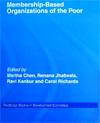Membership-Based Organizations of the Poor
The chapters in this book analyse different types of membership based organizations of the poor (MBOP). The book is characterised by a conviction that MBOPs play a central role in reducing poverty and achieving equitable growth.
MBOPs are accountable and democratic organisations that respond to the needs and aspirations of the poor. These include some trade unions, cooperatives, worker committees, credit and savings associations, community based associations, and producer groups among others. These can be further divided among those that organize members around work and livelihood related issues and those that organize around other issues.
It is argued by the editors that organizing around the worker identity has the advantages of focusing policy attention on the poor as economic agents and minimizing other identities that can be used to divide people. Furthermore, the worker identity brings to the fore the basic needs of earning a living and having a sense of dignity.
A central theme of the book chapters is upon the successes and failures of the studies organisations, and on the determinants of success. The variables studies range from internal democracy and finances of the organisations to the external policy environment.
View list of all: Books & Book Chapters


